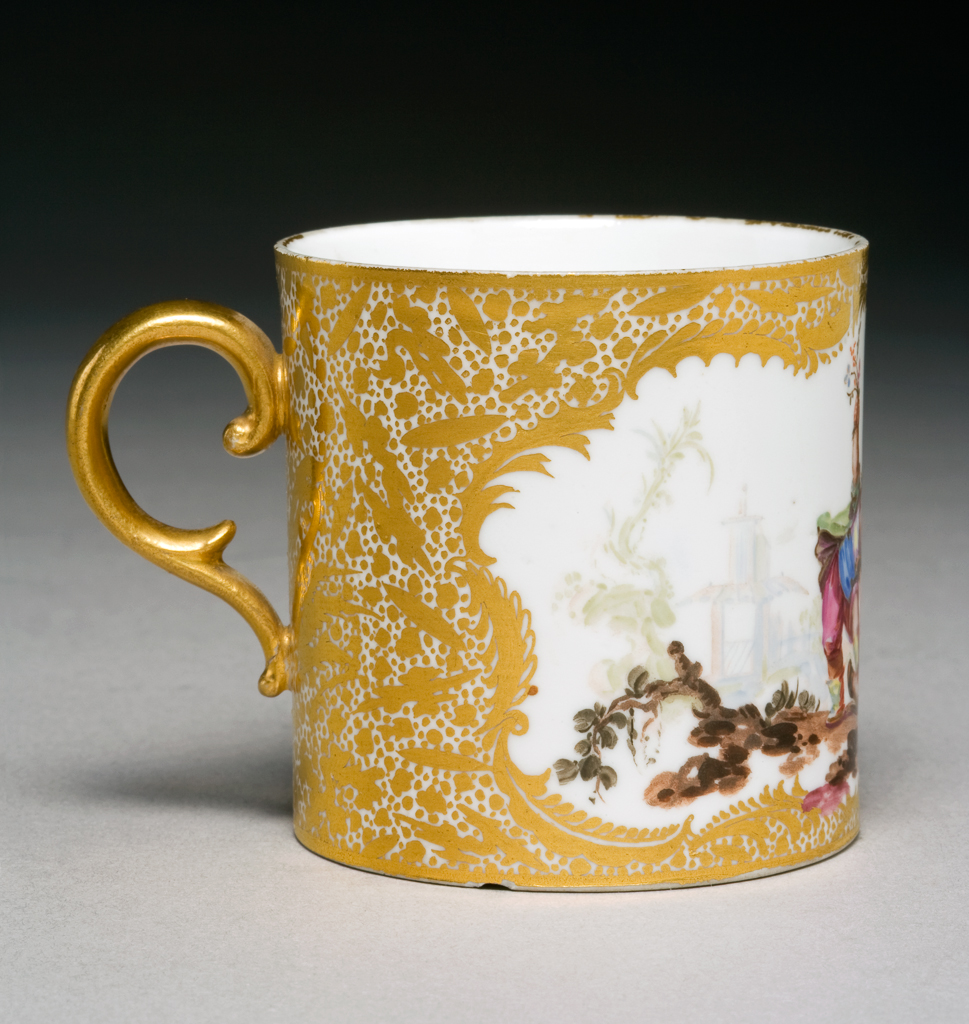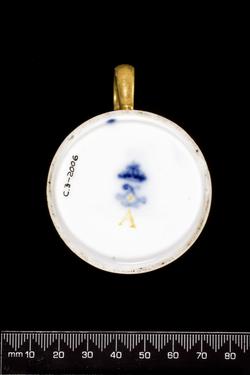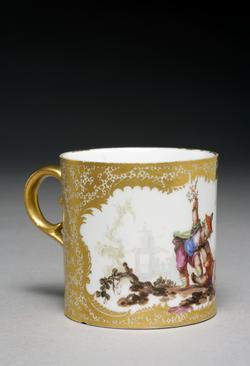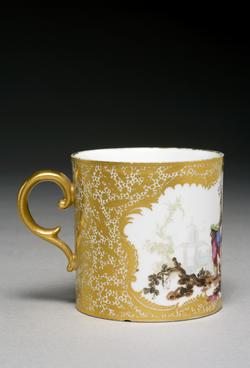Current Location: In storage
Titles
Gobelet litron
Maker(s)
Factory:
Sèvres Porcelain Manufactory
Painter:
Asselin, Charles Eloi
(Probably)
Entities
Categories
Description
Hard-paste porcelain painted in polychrome enamels with a chinoiserie scene of two boys fighting, and gilded with fantastic birds in a pointillé ground
Hard-paste porcelain, painted overglaze in pale blue, pale green, yellow, pale puce, red, shades of brown, and black enamel, and gilt. The cup is cylindrical with a scroll handle, standing on a slight footrim. (no hole for suspension). The front is decorated with a reserve enclosing a chinoiserie scene of two Chinese boys fighting, with a pale green tree and a darker leafy plant on the right, and a faint Chinese building , a pale green tree and a low leafy plant on the left. The rest of the surface is decorated in gold with fantastic birds in a pointillé ground. The handle is entirely gilt
Notes
History note: Kate Foster Ltd., 9 Halkin Arcade, Motcomb Street, London, SW1N 8JT and 5 Market Road, Rye, East Sussex TN31 7JA, invoice 6733, dated 12th June 1987
Legal notes
Bequeathed by Miss Hermione Hammond
Acquisition and important dates
Method of acquisition: Bequeathed
(2006-01-30)
by
Hammond, Hermione France Etheldreda
Dating
Louis XVI
Circa
1775
CE
-
1776
CE
Note
Charles-Elois Asselin worked at the factory between 1765-98 and 1800-04. mainly as a figure painter, and sometimes as a gilder, and burnisher of his own work. The fullest account of his career is given by Savill, who records that.that he was one of first painters to work on hard-paste, and was recorded painting Chinoiseries from 1772.
The gobelet litron was named after a circular measure, usually wooden, which was used for dry goods, such as corn and flour. It had been introduced at Vincennes before October 1752 when a stock inventory was take, and three sizes were in production in 1753. This is a gobelet litron of the third size.
The strange caillouté decoration in gold is reminiscent of a ground pattern executed in gold with blue dots on the sides of a cup in the Royal Collection, and Sir Geoffrey de Bellaigue noted another cup with comparable decoration and chinoiserie scenes bearing the date letter for 1779 and painted by Asselin in a private collection (See Documentation, Bellaigue, 2009).
School or Style
Rococo
Chinoiserie
Components of the work
Decoration
composed of
enamels
Deocration
composed of
gold
Base Of Cup
Diameter 5.6 cm
Rim Of Cup
Diameter 5.9 cm
Cup
Height 5.9 cm
Width 7.8 cm
Handle
Materials used in production
Glaze
Hard-paste porcelain
Techniques used in production
Glazing (coating)
Inscription or legends present
- Text: interlaced Ls below a crown
- Location: On base
- Method of creation: Painted underglaze in blue, which has blurred
- Type: Factory mark
- Text: a dot
- Location: On inside edge of footrim
- Method of creation: Painted underglaze in blue which has blurred
- Type: Mark
- Text: x
- Location: On base in centre of the interlaced Ls
- Method of creation: Painted in yellow
- Type: Date letter
- Text: A
- Location: On base below factory mark
- Method of creation: Painted in yellow
- Type: Painter's mark
References and bibliographic entries
Identification numbers
Accession number: C.3-2006
Primary reference Number: 126026
Entry form number: 638
Stable URI
Audit data
Created: Saturday 6 August 2011
Updated: Wednesday 13 September 2017
Last processed: Thursday 14 August 2025
Associated departments & institutions
Owner or interested party:
The Fitzwilliam Museum
Associated department:
Applied Arts

 IIIF Manifest
IIIF Manifest







